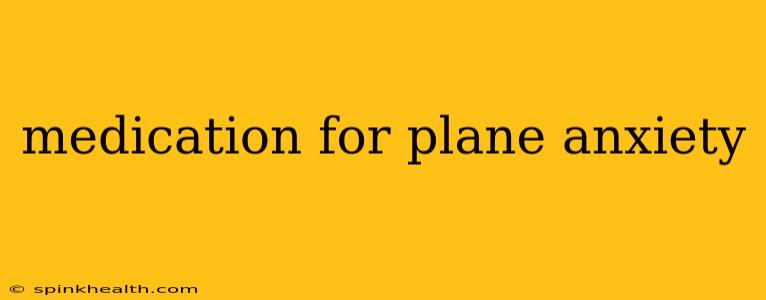Conquering Your Fears: Finding the Right Medication for Plane Anxiety
The roar of the engines, the confined space, the sheer height – for many, flying isn't just a mode of transportation; it's a source of intense anxiety. If the thought of boarding a plane sends shivers down your spine, you're not alone. Millions grapple with aviophobia, or fear of flying, and for some, medication offers a crucial lifeline to navigate this fear and reclaim their freedom to travel. This isn't about eliminating the fear entirely; it's about managing it effectively so you can enjoy your journey. Let's delve into the world of medications that can help.
This isn't a medical prescription, rather an exploration of options to discuss with your doctor. Remember, self-medicating is risky. Always consult a healthcare professional before starting any new medication.
What are the different types of medication for plane anxiety?
This is a frequently asked question, and the answer hinges on the type and severity of your anxiety. Your doctor will consider your overall health and the specifics of your anxiety before recommending a course of action. Typically, medications fall into a few categories:
-
Anxiolytics: These are medications specifically designed to reduce anxiety. Benzodiazepines, such as alprazolam (Xanax) or lorazepam (Ativan), are commonly prescribed for short-term use before flights. They work quickly and effectively, but carry a risk of dependence with prolonged use. Your doctor will carefully weigh the benefits and risks. Think of them as a powerful tool for a specific situation, not a long-term solution.
-
Beta-blockers: These medications primarily target physical symptoms of anxiety, like a racing heart, trembling hands, and sweating. They don't directly address the psychological aspects of anxiety but can significantly alleviate the uncomfortable physical manifestations during a flight. Propranolol is a common example.
-
Antidepressants: For individuals with persistent, severe anxiety related to flying that extends beyond isolated incidents, antidepressants, particularly selective serotonin reuptake inhibitors (SSRIs) or serotonin-norepinephrine reuptake inhibitors (SNRIs), may be considered. These are typically long-term solutions and require careful monitoring by your doctor. They don't offer immediate relief like benzodiazepines but can gradually reduce overall anxiety levels over time.
How long before my flight should I take medication?
This depends heavily on the medication prescribed. Your doctor will provide specific instructions, but generally, anxiolytics like benzodiazepines are taken a few hours before the flight to allow for sufficient time to take effect without causing excessive drowsiness. Beta-blockers might be taken closer to departure time, as their effect is more focused on physical symptoms. Never adjust your dosage without consulting your doctor.
Are there any side effects?
Yes, all medications have potential side effects. Benzodiazepines can cause drowsiness, dizziness, and impaired coordination. Beta-blockers can lead to low blood pressure or fatigue. Antidepressants can have a range of side effects, depending on the specific medication. Open communication with your doctor is key to understanding and managing any side effects that may arise.
What are some non-medication options for managing plane anxiety?
While medication can be a valuable tool, it shouldn't be the only strategy. Cognitive Behavioral Therapy (CBT) is a highly effective therapy for managing anxiety disorders, including aviophobia. CBT helps you identify and challenge negative thoughts and behaviors associated with flying, gradually reducing your fear over time. Relaxation techniques, such as deep breathing exercises and mindfulness, can also be beneficial in managing anxiety during a flight.
Can I take over-the-counter medication for plane anxiety?
While some over-the-counter medications like melatonin might help with sleep, they are not typically effective for managing the full spectrum of anxiety symptoms associated with flying. They're not a substitute for medications prescribed by a doctor, particularly for severe anxiety. Always consult a doctor before combining medications, even over-the-counter ones.
Remember, conquering your fear of flying is a journey, not a race. By working with your doctor to find the right approach, a combination of medication and therapy, along with coping strategies, you can significantly reduce your anxiety and finally enjoy the freedom of air travel. Don't hesitate to reach out to a healthcare professional to discuss your options and create a personalized plan that works best for you.

